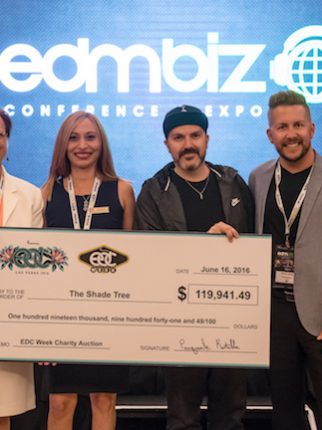A Culture of Confidence
Somewhere in Las Vegas, beyond the neon lights and multi-million-dollar productions on the Strip, 25 kids are making a difference through dance. They are the youth of Culture Shock, a nonprofit dance company and recipient of a donation from the Insomniac Charitable Giving Initiative.
“Our mission is using dance to empower the youth, give them the chance to have a voice and give them other options and lifestyles than what’s negative out there,” says Culture Shock Executive Director Vangie Bisquera-Golda. “They can be proud and embrace acceptance, achievement and self-confidence.”
Culture Shock originated in San Diego in 1993 with Nike Fitness Trainer Angie Bunch. Two years later, Culture Shock Las Vegas began with director Darryl Thomas.

“We’re going into our 20th year,” says Bisquera-Golda, “and pretty much the vision is: We want to be innovative in our performance, artistic development and community enrichment, [bringing] hip-hop dance to diverse audiences.” However, she adds, “We’re not really all hip-hop anymore. We call it ‘urban’ because it’s what’s out there and what the kids see. Some of our dancers are technical dancers, and they’re able to make us a little bit more urban contemporary and more diverse now. We like to be different, and we don’t quite fit any genre right now.”

Currently in the program are approximately 25 students, ranging from seven to 18 years old, as well as 25 adults. Interested dancers audition for their spot, and many earn a scholarship to participate. “The adults in our program turn into volunteers and become directors or lead choreographers,” says Bisquera-Golda. “It’s a lot of giving back. Our program is all volunteer—even myself and the board members. Even the veterans that left are still coming back and helping out with choreography.”
Some of those veterans include dancers that have fine-tuned their skills and gone on to perform with Cirque du Soleil in the Michael Jackson One show at Mandalay Bay. “They were in our program when they were 14, and now they’re in their 20s and 30s, and they still come back and help us out,” Bisquera-Golda says. “They just want to make sure it has continued success because of what it’s done for them.”

But even with its success so far, Culture Shock still faces challenges that the Insomniac donation will help overcome. It’s being funded by the most ambitious program in the five-year history of Insomniac’s Charitable Giving initiative. For the first time ever, the company has spearheaded an extensive auction in which dozens of Las Vegas and EDC-related experiences—including the opportunity to arrive at the festival via helicopter and be onstage with a DJ during their set at EDC—are made available to the public. The money raised from that auction will help Culture Shock address some of its most pressing needs.
“Being in our program, some of the shy kids are able to express themselves another way, and they feel good when they’re in front of the crowd. It builds self-esteem, and it gives them another outlet.”
“The biggest obstacle we have right now is trying to find a home. We don’t really have a studio because of funds,” says Bisquera-Golda. For the time being, EOS Fitness allows Culture Shock to rehearse in their space after-hours. With their own studio space, they’ll be able to hold additional rehearsals, as well as allowing more kids into the program.
The donation will also help the program up its performance game. “Most of the time, we just tell the kids, ‘Okay, this is the color scheme, and come up with whatever gear you have,’ and they just put it together. It’d be nice for them to have something when they walk into a place. They’d have costumes and look like a team coming in, rather than just whatever T-shirt they have.”
With a variety of performances at events, such as Teach for America at the Smith Center and the NBA Summer League halftime show, the youth of Culture Shock have proven their work hard and dedication. That drive extends into their academics, as participants must maintain good grades in order to remain in the program. It’s an additional positive influence that comes from having several volunteers who are also educators.
“I’ve been teaching for 20-something years,” says Bisquera-Golda, “and I think a lot of times the kids just don’t have a voice; they don’t have self-confidence. Being in our program, some of the shy kids are able to express themselves another way, and they feel good when they’re in front of the crowd. It builds self-esteem, and it gives them another outlet. Not everybody can be good at certain sports, and this is somewhere they can excel. Hopefully, with the self-confidence they have, they can feel they can do anything.”
Photos by Erik Kabik



